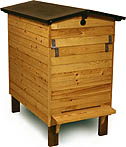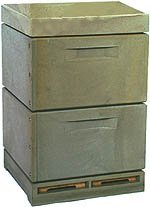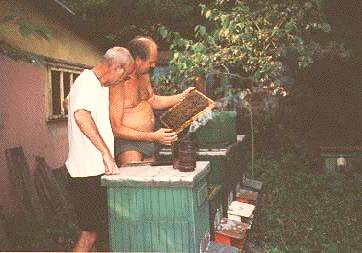This little fellow is what this is all about.
I started keeping bees in 1999. As I had never kept bees before (unless you count in the "feral" bees we had in the garden when I was a kid), I contacted the local local beekeeping association branch, Fredericia Biavlerforening, where I received a very friendly welcome. There a beginner will get practical help and advice from experienced beekepers almost every step on the way. From spring to autumn there is a meeting every second week at the local school apiary, where beginners can learn the do's and don't's of beekeeping. They will even provide beginners with their first bees.
At first, I had the bees in my garden, but when I reached three hives with bees, I started looking for other places to place my hives. Not because the bees were troublesome, but because they had trouble collecting enough food for themselves. In the process, I spotted some empty hives and contacted the owner, who sold them to me cheap. I also took over the sites. Before that, I had already managed to secure several other sites, so I soon had ten+ good sites for future apiaries, four hives with bees and more than twenty empty hives that I was in the process of restoring. I enjoyed myself thouroughly.
As you can see, my beekeeping initially evolved in great leaps, which is a thing I'd generally advice against, as you don't want to overextend neither yourself nor your economy. The stories about new beekeepers that overextend and burn themselves out in a few seasons are plenty. In my case, I teamed up with a local longtime beekeeper who supplied the experience, while I supplied the zest and ideas.
I had plans for my beekeping, so I soon joined what you could call the Danish queen breeders association and was also approved as an importer of bee queens. I also served on the board of the local branch of the beekeeping association.
That was then. Now I'm content with just managing my own beea and experimenting with various hive types and management practices. I thoroughly enjoy keeping bees. It gives me great satisfaction and I really relax when I'm working a hive.
When I tell people about my interest in bees, the most common reaction is to ask me whatever makes me want to do such a wierd thing - bees sting, don't they ? This question often stems from ignorance, as a surprising number of people cannot tell a bee from a yellowjacket (wasp).
I'm keeping bees, NOT yellowjackets.

Yes, bees CAN sting, and will do so if sufficiently provoked. However, you should keep in mind that when a bee stings, it is a suicidal act, as it will soon die without the hooked stinger, which is left in the victims skin.
  |
In fact, honey bees produce or collect a variety of products that benefit people. These products include honey, beeswax, pollen, royal jelly, and propolis. Although honey bees can be managed to produce large quantities of these products, they are especially valued for the major role they play in pollination. While other insects and animals play an important role, people have had little control over the actions or numbers of these pollinators. However, honey bees can be placed wherever and whenever they are needed. Also, honey bees have additional advantages over other pollinators, including their availability in large numbers and their instinctive pollen hoarding behavior. Without the pollinating service of honey bees, the cost of many fruits, vegetables, legumes, and seeds would be many times what it is today.
-oOo-
As I like to know how things are put together, I have searched high and low on the web for plans to build a beehive. This is what I found:
![]()
Parts of a Langstroth beehive
BeeSource - among other things, they have plans for beekeeping equipment, including hives.
Having done that, let me hasten to add that I didn't build my own hives at that time. Partly because I had plenty of other construction project, but more important because I could buy prefabricated hives that were superior to those I could build myself.

 There are two main styles of hives in use here in Danmark: The trough hive, also called a coffin hive, (left) and the stacking hive, also called a vertical hive, (right). The latter has pretty much taken over from the trough hive. The modern stacking hives are often made from polyurethane or hard EPS, which not only makes them close to maintenance free, as opposed to the older types made of wood, but also "happens" to make the hive well insulated. The stacking hives are modular and enable you to manage the bees and honey with less work - if you have a strong back to lift the heavy boxes. I have heard claims of twice (or more) the number of hives with the same amount of work.
There are two main styles of hives in use here in Danmark: The trough hive, also called a coffin hive, (left) and the stacking hive, also called a vertical hive, (right). The latter has pretty much taken over from the trough hive. The modern stacking hives are often made from polyurethane or hard EPS, which not only makes them close to maintenance free, as opposed to the older types made of wood, but also "happens" to make the hive well insulated. The stacking hives are modular and enable you to manage the bees and honey with less work - if you have a strong back to lift the heavy boxes. I have heard claims of twice (or more) the number of hives with the same amount of work.
Initially, I too preferred the stacked hives, but as time has progressed, I've realized that:
 In conclusion, I'm "fixin'" to move to more enjoyable management practices and hive types. I find that I'm drawn to home built Warré hives and ditto horizontal hives with Layens or Svea frames, both of those frame types offer far better wintering survivability than Langstroth frames.
In conclusion, I'm "fixin'" to move to more enjoyable management practices and hive types. I find that I'm drawn to home built Warré hives and ditto horizontal hives with Layens or Svea frames, both of those frame types offer far better wintering survivability than Langstroth frames.
I have experimented with building and using the Warré hives, and I like them, especially for out apiaries. Rest assured that I do intend to use a small, portable box lifter with the Warré boxes.
For my home apiariy, I intend to move to horizontal hives. No more heavy lifts for me. Not because I have problems with my back, but because I want to prevent problems with my back.
Here in Danmark we mainly use three kinds of bees, Buckfast, Apis Mellifera Ligustica and, a few A.M. Carnica. Danish bees have been bred to be peaceful and resistant to "foul brood". We do try to maintain the island Læsø as a reserve for what's left of the original Nordic brown bee, but face serious opposition from a few thick-skulled diehards who seem to think that their personal avarice is more important than genetic diversity. The bees I have been using so far, are Buckfast, with a short, not too successful detour to Carnica. Carinca is a fantastic bee breed for certain environments, if you know what you are doing, but it's not for beginners, as I quickly learned.

Starting with beekeeping
When you start considering becoming a beekeeper, you will probably at some time leaf through a catalog from a beekeping supplier and be overwhelmed by all the different equipment. All of a sudden it looks like you will have to spend countless thousands in order to become a beekeeper. Well, rest assured, it's not that bad in reality, as you don't need most of them doodads.
Regardless of the number of hives you want to start out with, there is some personal equipment you will need.
 The third important piece of equipment is the smoker, which is used to pacify the bees. In the wild, the smell of smoke (think forrest fire) will send the bees indoors to fill up with honey. That way they will have a full belly if they are forced to leave their hive. This behaviour has the advantage that a bee with a full stomach cannot sting - it cannot bend enough. A few puffs of smoke in front of the entrance is usually enough. Some bees, like mine, are so peacefull that you can do without a smoker throughout most of the season, but it is still good practice.
The third important piece of equipment is the smoker, which is used to pacify the bees. In the wild, the smell of smoke (think forrest fire) will send the bees indoors to fill up with honey. That way they will have a full belly if they are forced to leave their hive. This behaviour has the advantage that a bee with a full stomach cannot sting - it cannot bend enough. A few puffs of smoke in front of the entrance is usually enough. Some bees, like mine, are so peacefull that you can do without a smoker throughout most of the season, but it is still good practice.The list of basic beekeeping equipment is not overly complicated. If you go with stacking hives, you will need a complete hive consisting of a bottom, a roof and at least four magazines, each with (usually ten) frames, for each bee colony. Extra frames will come in very handy during the year. You will also need extra honeycomb foundation and some wire for the frames. For keeping Varroa down, you will need a Nassenheider evaporater for formic acid and a special 3-section drone frame. I recommend against using pesticides.
For harvesting the honey you will need a special fork, or a spiked roller, for uncapping sealed honeycomb, a sieve, a bucket and a stick for stirring the honey. Crush and strain works just fine for starters.
That's about it - for starters. Later you will feel the need for more equipment, but in the beginning I suggest you cultivate a local beekeeper, who not only can show you the tricks of the trade, but also is likely to offer you the use of various equipment. Usually the best way repay him (or her), is by helping new beekeepers when you yourself have gained experience. At least, that's how it works here.
And _P_L_E_A_S_E_ don't forget the words of Brother Adam: Scientiffic knowledge without practical experience is of no use. While I have had good use of all the stuff I've read, it has not prepared me to do everything right, nor how to recognize e.g. a slow robbery or the early signs of disease. There were also a few things I had misunderstood - practical experience sets everything in a new perspective. Far too many second year beekeepers think they know it all. I can assure you, they don't! I highly recommend reading this article Beekeepers and the Dunning-Kuger effect - unskilled and unaware.
--oOo--
Links
(It's an oooold list. Quite a few links are bound to have become dysfunct)
Comments to ![]() ping@bimesteren.dk
ping@bimesteren.dk